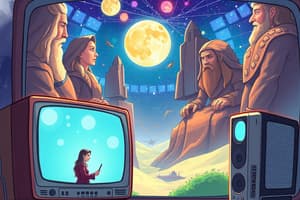Podcast
Questions and Answers
Television content can be divided into five main types.
Television content can be divided into five main types.
False (B)
Soap operas are broadcast weekly for several months.
Soap operas are broadcast weekly for several months.
False (B)
Mini-series have a large number of episodes.
Mini-series have a large number of episodes.
False (B)
Sit-coms feature changing characters in each episode.
Sit-coms feature changing characters in each episode.
Anthology series feature the same story throughout the series.
Anthology series feature the same story throughout the series.
Comedy shows/sketch shows feature long, continuous stories.
Comedy shows/sketch shows feature long, continuous stories.
TV advertisements are a type of fiction content.
TV advertisements are a type of fiction content.
Fictional content only includes TV dramas and animated pictures.
Fictional content only includes TV dramas and animated pictures.
News shows provide the most updated information on a weekly basis.
News shows provide the most updated information on a weekly basis.
A talk show typically involves a one-on-one interview or debate.
A talk show typically involves a one-on-one interview or debate.
News reporting is not a journalistic profession.
News reporting is not a journalistic profession.
Live reporting involves broadcasting an event after it takes place.
Live reporting involves broadcasting an event after it takes place.
Feature stories are typically 10-15 minutes long.
Feature stories are typically 10-15 minutes long.
Documentaries are typically 1-hour long programs.
Documentaries are typically 1-hour long programs.
Reality shows originated in the 1990s.
Reality shows originated in the 1990s.
News anchors are also referred to as news readers.
News anchors are also referred to as news readers.
A TV program that shows travel reviews is an example of a Cooking Show.
A TV program that shows travel reviews is an example of a Cooking Show.
Soap operas often reflect the culture, values, and societal issues of a particular country or region.
Soap operas often reflect the culture, values, and societal issues of a particular country or region.
Public diplomacy can raise awareness about important issues such as public health and human rights through Soap operas.
Public diplomacy can raise awareness about important issues such as public health and human rights through Soap operas.
Educational Shows are programs that broadcast music.
Educational Shows are programs that broadcast music.
Public diplomacy can utilize soap operas as a platform to depict stories of forgiveness and understanding.
Public diplomacy can utilize soap operas as a platform to depict stories of forgiveness and understanding.
Streaming television is the digital distribution of television content through DVDs.
Streaming television is the digital distribution of television content through DVDs.
Soap operas can create emotional connections between fans from different countries.
Soap operas can create emotional connections between fans from different countries.
Game Shows are programs that explore a wide range of topics as diet, food, fashion, and social topics.
Game Shows are programs that explore a wide range of topics as diet, food, fashion, and social topics.
Flashcards are hidden until you start studying
Study Notes
Television Program Formats
Fictional Content
- Refers to imaginary storylines portrayed in dramatic scenes, created to unfold an authored story
- Includes TV dramas, animated pictures, and advertisements
- Types of fictional formats:
- Soap Operas
- Television dramatic series that show interactions, problems, and lives of groups of people
- Divide into multiple episodes, broadcast daily for several weeks
- Named after early TV sponsors, usually detergent companies
- Mini-Series (Serials)
- Television dramas with a limited number of episodes (5-7)
- Example: Moon Knight series
- Sit-coms
- Situational comedies, characters are continuous but each episode features a new situation
- Example: Friends
- Anthology Series
- Dramatic series that show a different story in each episode or group of episodes
- Example: The Twilight Zone
- Comedy Shows/Sketch Shows
- Television programs that consist of short comedy scenes
- Example: Saturday Night Live
- TV Advertisements
- Known as TV commercials or spots, usually include a fictional situation with different characters
- Soap Operas
Non-Fictional Content
- Real events and places, no actors but real people
- Combines all other types of informative and factual content
- Types of non-fictional formats:
- News
- Most common non-fictional content
- Provides updated information, example: Daily Show
- News Programs
- Analysis and discussion of news stories and events
- Also called "current affairs" shows, tackling contemporary social, political, and economic issues
- Talk Show
- Discussion of various topics, example: The Man Show
- Can involve interviews, debates, or simple conversations
- News Report
- Involves discovering and presenting relevant facts
- Main function of journalistic profession
- Live Reporting
- Broadcasting an event as it takes place
- Audience witnesses live images and sound
- Feature Stories
- Relying on reporting real activities of real people in their real locations
- Longer (3-5 minutes), broadcast at the end of newscasts or within news programs
- Documentary
- Provides in-depth information, fact-based treatment of events and issues
- Topics can be natural, scientific, historical, political, economic, cultural, or social
- Reality Shows
- Ordinary people challenged to win prizes, record and show real interactions between participants
- Example: Arab Idol
- Game Shows/Quiz Shows
- Ordinary people in studio or at home use skill or luck to win prizes
- Music Shows
- Programs that broadcast music, can take the form of talent game shows
- Example: Arab Idol
- Educational Shows
- Programs with the aim of educating children
- Lifestyle and Women Programs
- Programs that explore a wide range of topics, such as diet, food, fashion, social topics, etc
- Travel Show
- TV program that shows travel reviews
- Cooking Show
- Often in a restaurant kitchen or on a studio set, or at the host's personal home
- News
Streaming Television
- Digital distribution of television content, such as TV shows, as streaming media delivered over the Internet
Drama and Public Diplomacy
- Cultural Exchange and Understanding
- Soap operas can reflect the culture, values, and societal issues of a particular country or region
- Public diplomacy can promote cultural exchange and enhance understanding between different countries
- Conflict Resolution and Peace building
- Soap operas can address conflicts that exist within or between societies
- Public diplomacy can utilize soap operas as a platform to depict stories of forgiveness and understanding
- Social Messaging and Awareness
- Soap operas have significant influence over a wide audience
- Public diplomacy can raise awareness about important issues, such as public health, gender equality, human rights
- Soft Power Projection
- Soap operas can serve as a means for projecting a country's soft power
- Public diplomacy can shape perceptions, and create a positive impression of a country's cultural output, creativity, and values
- People-to-People Connections
- Soap operas can create emotional connections between audiences
- Public diplomacy can facilitate interactions and exchanges between fans from different countries
Studying That Suits You
Use AI to generate personalized quizzes and flashcards to suit your learning preferences.




